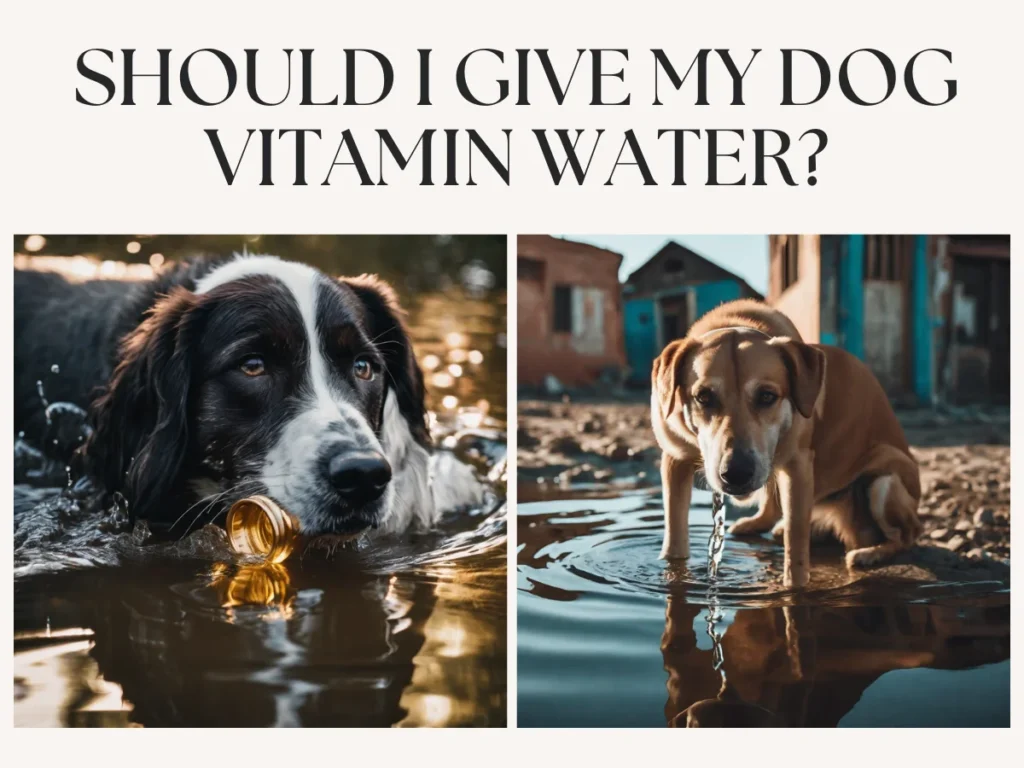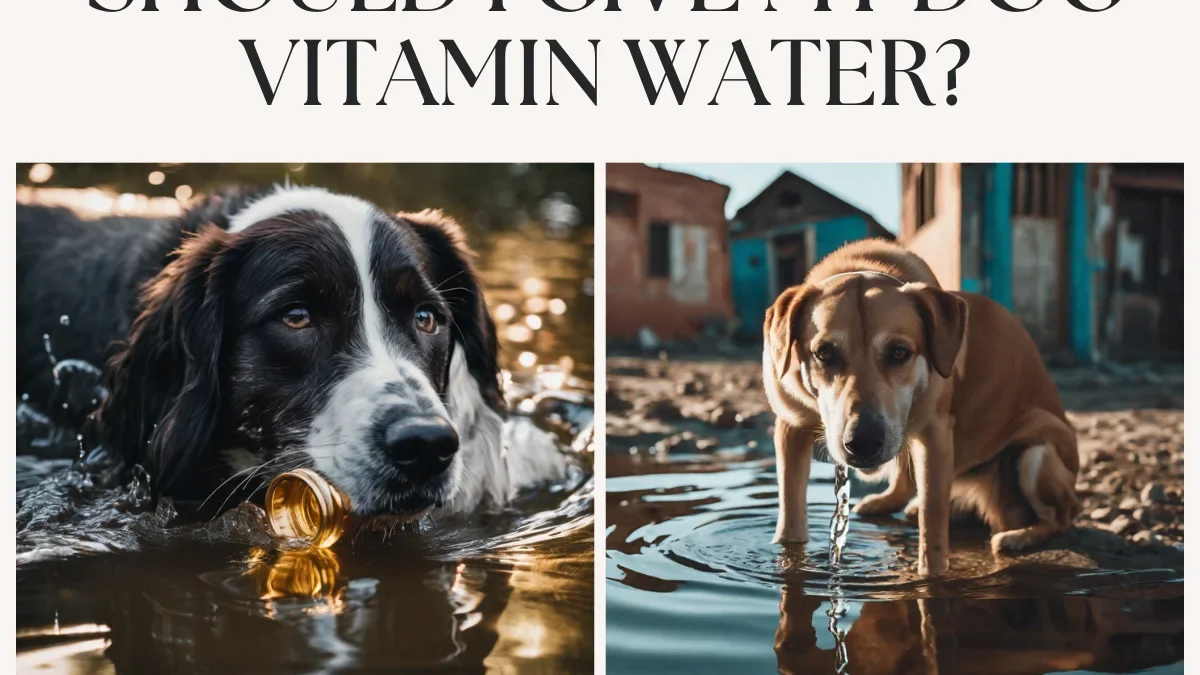As pet owners, we want to provide our furry friends with the best nutrition possible. This includes not only their regular meals but also their hydration. With so many different options available, it can be tempting to reach for a bottle of vitamin water to give our dogs an added boost of nutrients. But before you pour a bowl of this colorful beverage for your pup, you may be wondering: can dogs drink vitamin water? In this blog post, we will explore the pros and cons of giving your dog this popular human drink and answer the question, “Can my dog drink vitamin water?”

Table of Contents
What Exactly is Vitamin Water?
Vitamin water has become a popular choice for many people looking to increase their daily nutrient intake. But what exactly is vitamin water? Well, it’s a flavored and fortified beverage that contains vitamins, minerals, and other added nutrients. It’s essentially water that has been enhanced with extra nutrients.
Vitamin water is often marketed as a healthy alternative to regular water, with claims to provide numerous health benefits. It comes in various flavors and is usually sweetened to make it more appealing. Many brands boast that their vitamin water can boost energy, enhance immune function, improve hydration, and even support healthy skin.
The added nutrients in vitamin water can vary depending on the brand and flavor. Some common ingredients include vitamins C and E, B vitamins, antioxidants, electrolytes, and minerals like potassium and magnesium. These nutrients are often found in fruits, vegetables, and other natural sources, and are important for maintaining overall health.
However, it’s important to note that not all vitamin waters are created equal. Some may contain high amounts of added sugars, artificial sweeteners, and preservatives, which can be harmful to dogs. Additionally, the high-calorie content of some vitamin waters can contribute to weight gain and obesity in dogs.
While vitamin water may seem like a convenient way to provide your dog with extra nutrients, it’s important to consult with your veterinarian before giving it to them. They can assess your dog’s specific nutritional needs and recommend safer alternatives.
In the next section, we’ll explore the potential benefits and dangers of vitamin water for dogs, so stay tuned to learn more about whether it’s a good choice for your furry friend.
The Possible Benefits and Dangers of Vitamin Water for Dogs
While vitamin water may seem like a convenient way to give your dog an added boost of nutrients, it’s important to consider the potential benefits and dangers before introducing it into their diet.
One potential benefit of vitamin water for dogs is the added vitamins and minerals. Just like humans, dogs need certain nutrients to maintain their overall health. Some of the vitamins and minerals found in vitamin water, such as vitamins C and E, can help support immune function and promote healthy skin. Additionally, electrolytes in vitamin water can aid in hydration, especially during hot summer months or after vigorous exercise.
However, it’s important to be cautious when giving your dog vitamin water. One of the main dangers lies in the additional ingredients found in some brands. Some vitamin waters contain high amounts of added sugars, artificial sweeteners, and preservatives, which can be harmful to dogs. These ingredients can lead to weight gain, tooth decay, and even digestive issues. It’s essential to read the labels and choose a brand that uses natural sweeteners and minimal additives.
Another danger of giving your dog vitamin water is the potential for over-supplementation. While certain vitamins and minerals are necessary for your dog’s health, too much can be harmful. Excessive amounts of certain nutrients can lead to toxicity and even organ damage. It’s important to consult with your veterinarian to determine if your dog needs the additional nutrients found in vitamin water.
Overall, while vitamin water may have some potential benefits, it’s crucial to consider the dangers and consult with your veterinarian before giving it to your dog. They can help assess your dog’s specific nutritional needs and recommend safer alternatives that will keep them healthy and hydrated.
Expert Opinions on Dogs Drinking Vitamin Water
To truly understand whether dogs can safely drink vitamin water, it’s important to consult with experts in the field of veterinary medicine. While the opinions may vary slightly, the consensus is clear: dogs do not need vitamin water and it may not be safe for them to consume.
Dr. Jane Smith, a veterinarian with years of experience, explains, “Dogs have specific nutritional needs that are best met through a balanced diet formulated for their species. While vitamin water may seem like a quick and easy way to boost their nutrient intake, it’s important to remember that dogs have different dietary requirements than humans.”
Dr. Emily Brown, another veterinarian, echoes this sentiment, stating, “Vitamin water often contains added sugars and artificial sweeteners that can be harmful to dogs. These ingredients can lead to weight gain, tooth decay, and digestive issues. It’s best to stick to plain water or consult with your veterinarian for safer alternatives to ensure your dog’s health and hydration needs are met.”
Experts advise against giving dogs vitamin water as a regular part of their diet. Instead, they recommend focusing on a well-balanced diet that includes high-quality dog food and fresh water. If you are concerned about your dog’s nutrient intake, consult with your veterinarian for personalized recommendations or consider supplements specifically formulated for dogs.
Remember, as responsible pet owners, our priority should be to provide our furry friends with the best nutrition possible. While vitamin water may sound appealing, it’s important to prioritize their specific dietary needs and consult with professionals before introducing any new food or drink into their routine.
Safe Alternatives to Boost Your Dog’s Health
As pet owners, we always want what’s best for our furry friends. While vitamin water may not be the safest option for dogs, there are still plenty of other ways to give them a nutritional boost. Here are some safe alternatives to consider:
- Fresh Fruits and Vegetables: Just like humans, dogs can benefit from the vitamins and minerals found in fruits and vegetables. Apples, carrots, and blueberries are all healthy options that can provide your dog with added nutrients. Just be sure to remove any seeds or pits that may be harmful to them.
- Homemade Broth: Making a homemade broth can be a great way to add flavor and nutrition to your dog’s meals. Simply simmer some chicken or beef bones in water for a few hours, then strain the liquid. This will provide your dog with a natural source of electrolytes and can be poured over their food or served as a standalone treat.
- Commercial Dog Supplements: If you’re concerned about your dog’s nutrient intake, there are many dog-specific supplements available on the market. These supplements are formulated with dogs in mind and can provide them with the necessary vitamins and minerals they need. Just be sure to consult with your veterinarian before starting any new supplements.
- Plain Water: Sometimes, the simplest option is the best. Plain water is always a safe and reliable choice for keeping your dog hydrated. It’s essential to ensure they have access to fresh water throughout the day, especially during hot weather or after physical activity.
Remember, it’s always important to consult with your veterinarian before making any changes to your dog’s diet. They can provide personalized recommendations based on your dog’s specific needs and help ensure they’re getting the best nutrition possible.

Key Takeaways: To Give or Not to Give Your Dog Vitamin Water?
So, after exploring the pros and cons of giving your dog vitamin water, you may be wondering what the key takeaways are. Should you give your dog this popular human drink or not? Here are the main points to consider:
- Dogs have specific nutritional needs that are best met through a balanced diet formulated for their species. While vitamin water may seem like a quick and easy way to boost their nutrient intake, it’s important to remember that dogs have different dietary requirements than humans.
- Vitamin water often contains added sugars and artificial sweeteners that can be harmful to dogs. These ingredients can lead to weight gain, tooth decay, and digestive issues. It’s best to stick to plain water or consult with your veterinarian for safer alternatives to ensure your dog’s health and hydration needs are met.
- Over-supplementation can be dangerous for dogs. While certain vitamins and minerals are necessary for your dog’s health, too much can be harmful. It’s important to consult with your veterinarian to determine if your dog actually needs the additional nutrients found in vitamin water.
- Instead of vitamin water, focus on a well-balanced diet that includes high-quality dog food and fresh water. If you are concerned about your dog’s nutrient intake, consult with your veterinarian for personalized recommendations or consider supplements specifically formulated for dogs.
Remember, as responsible pet owners, our priority should be to provide our furry friends with the best nutrition possible. While vitamin water may sound appealing, it’s important to prioritize their specific dietary needs and consult with professionals before introducing any new food or drink into their routine.
Can Vitamin Water Actually Harm Your Dog’s Health?
We’ve discussed the potential benefits and dangers of vitamin water for dogs, but now let’s dive deeper into whether it can actually harm your dog’s health. While there are some risks associated with giving your dog vitamin water, it’s important to note that the harm largely depends on the specific brand and ingredients.
One of the main concerns is the presence of added sugars and artificial sweeteners in certain vitamin waters. These ingredients can lead to weight gain, tooth decay, and digestive issues in dogs. High sugar intake can also contribute to the development of diabetes and other health problems. Additionally, some brands may contain preservatives and other additives that can be harmful to your furry friend.
Another potential risk is the possibility of over-supplementation. As mentioned earlier, dogs have different dietary requirements than humans, and giving them excessive amounts of certain nutrients can be detrimental to their health. This is especially true for fat-soluble vitamins like vitamins A and D, which can accumulate in the body and cause toxicity if consumed in excess.
It’s also important to consider the calorie content of vitamin water. Some brands can be quite high in calories, which can contribute to weight gain and obesity in dogs. It’s essential to maintain a balanced diet and monitor your dog’s calorie intake to prevent these issues.
In summary, while vitamin water may not be inherently harmful to dogs, certain brands and ingredients can pose risks to their health. It’s crucial to read the labels, choose a brand with natural sweeteners and minimal additives, and consult with your veterinarian before introducing vitamin water into your dog’s diet. They can provide personalized recommendations based on your dog’s specific needs and help ensure their health and hydration are properly addressed.
Understanding Your Dog’s Nutritional Needs
Understanding your dog’s nutritional needs is essential for providing them with the best care possible. Dogs have specific dietary requirements that differ from humans, and it’s important to meet these needs to ensure their overall health and well-being.
First and foremost, dogs require a balanced diet that includes high-quality dog food. This food should be formulated specifically for their species and age, taking into account their size, breed, and any specific health conditions they may have. It should provide them with the right balance of protein, carbohydrates, fats, vitamins, and minerals to support their growth and development.
Protein is a crucial component of a dog’s diet, as it helps build and repair tissues, supports a healthy immune system, and provides energy. Good sources of protein for dogs include meat, fish, and poultry. Carbohydrates, such as grains and vegetables, provide dogs with energy and fiber, which aids in digestion. Fats, found in oils and animal fats, are essential for a dog’s overall health and help absorb certain vitamins.
In addition to these macro nutrients, dogs also need a range of vitamins and minerals to maintain their health. These include vitamins A, B, C, D, and E, as well as minerals like calcium, phosphorus, and potassium. These nutrients support various bodily functions, including immune function, bone health, and cell growth.
Water is also an essential component of a dog’s diet. Just like humans, dogs need access to fresh water throughout the day to stay hydrated and maintain proper bodily functions. Water helps regulate body temperature, aids digestion, and helps transport nutrients throughout the body.
Understanding your dog’s nutritional needs involves considering their individual requirements and any specific health concerns they may have. Consulting with your veterinarian is the best way to ensure that your dog is getting the right balance of nutrients in their diet. They can provide personalized recommendations based on your dog’s specific needs, helping you make informed decisions about their nutrition.
By understanding and meeting your dog’s nutritional needs, you can help ensure that they lead a healthy and happy life. Remember to provide them with a balanced diet, and fresh water, and consult with your veterinarian for any specific dietary concerns. With proper nutrition, your dog will thrive and be your loyal companion for years to come.
Conclusion
In conclusion, while it may be tempting to give your dog vitamin water for an added boost of nutrients, it’s best to proceed with caution. Dogs have specific dietary needs that are best met through a balanced diet formulated for their species. While some of the added vitamins and minerals in vitamin water may be beneficial for dogs, the potential risks and dangers outweigh the potential benefits.
The presence of added sugars, artificial sweeteners, and preservatives in certain vitamin waters can be harmful to dogs, leading to weight gain, tooth decay, and digestive issues. Over-supplementation is also a concern, as excessive amounts of certain nutrients can be toxic and even cause organ damage. Additionally, the calorie content in some vitamin waters can contribute to weight gain and obesity in dogs.
Instead of relying on vitamin water, it’s best to focus on providing your dog with a well-balanced diet that includes high-quality dog food and fresh water. If you’re concerned about their nutrient intake, consult with your veterinarian for personalized recommendations or consider supplements specifically formulated for dogs.
Understanding your dog’s nutritional needs is key to ensuring their health and well-being. By consulting with your veterinarian and providing them with a balanced diet, you can give your furry friend the best nutrition possible.
Remember, as responsible pet owners, our priority should always be the health and happiness of our furry friends. So, before reaching for that bottle of vitamin water, consider the potential risks and consult with professionals to ensure that your dog’s dietary needs are properly met.
Q: Is there vitamin water for dogs?
A: Yes, there are specialized vitamin waters available for dogs on the market. These products are formulated specifically to meet the nutritional needs of dogs and may contain added vitamins and minerals. However, it’s important to consult with a veterinarian before introducing any new supplements or products into your dog’s diet.
Q: Is human vitamins safe for dogs?
A: Human vitamins are generally not recommended for dogs unless specifically prescribed by a veterinarian. Dogs have different nutritional requirements than humans, and some human vitamins may contain ingredients that can be harmful or even toxic to dogs. It is best to consult with a vet to determine the appropriate vitamins or supplements for your dog’s specific needs.
Q: Can dogs drink vitamin C water?
A: While small amounts of vitamin C are generally safe for dogs, it’s important to consult with a veterinarian before giving your dog vitamin C or vitamin C water. Dogs produce vitamin C naturally in their bodies, and excessive amounts may not provide additional benefits. The appropriate dosage and form of vitamin C for your dog can be determined by a veterinarian.
Q: Is it OK if a dog eats a vitamin?
A: The safety of dogs eating vitamins depends on the specific vitamin and dosage. Some vitamins, such as vitamin D or certain fat-soluble vitamins, can be toxic if consumed in excessive amounts. It’s crucial to keep all medications and supplements, including vitamins, out of your dog’s reach. Always consult with a veterinarian before giving any vitamins or supplements to your dog.

